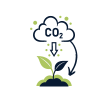
Carbon Sequestration Questions
Q: How much land do I need to have a carbon project?
A: Generally speaking the cost of running a project needs to be weighed up against the benefits you will gain. To make a project viable it needs to be of a scale that makes economic and environmental sense. We find that occurs around 100 hectares depending on the project method type.
Q: What methods are available to me?
A: The Clean Energy Regulator is responsible for operating and publishing the methods for carbon sequestration in Australia. There are a number of methods currently available and many in development. It is best to check their website for further information on methods and eligibility requirements. In general terms agricultural land has soil carbon sequestration, standing (vegetation) carbon sequestration via protection or planting or animal management methods.
Q: How do I get paid for my carbon?
A: When you sell your accumulated Australian Carbon Credit Units (ACCUs) either via the government auction or to private investors you will recieve a cash price per unit.
Q: Do I have to sell my ACCUs?
A: No you don’t have to sell them there are multiple options which you will need to consider based on your business needs. We can assist you in understanding the path forward.
Q: Aren’t carbon credits just offsets for big polluters?
A: We hear this question quite a lot. In fact the Australian Carbon Credit Scheme is one of the most robost in the world with many other nations looking to our system to create their own. Offset units are purchased to account for emissions a business produces, to help reduce their overall carbon footprint. Offset units are generated by projects that reduce, remove or capture emissions from the atmosphere such as reforestation, renewable energy or energy efficiency. One carbon credit is issued for each tonne of emissions avoided, removed or captured from the atmosphere. For more information check out this article from Climate Active.
Q: How do I find out if I qualify for a carbon project on my property?
A: We offer a FREE 30 minute call to understand the potential for a project. During this call we will look at your property for potential project options using up to date satellite imagery and discuss your current management and future plans. If you decide to investigate further we will provide you with a quote for a full feasibility study and project registration.
Q: Is it true the banks don’t like these types of projects?
A: Not at all, in fact many banks are very proactive in this area. As an the holder of an interest in your property via a mortgage or similar instrument the banks become your partner in the project and as such will want clear details of the costs, risks and projected outcomes. It’s a good idea to engage them early in the process so that you can work together to achieve your goals.

Partnering with Community Questions
Q: How do you partner with community?
A: As can be seen on our project showcase page, Ready to Adapt is very active in the social impact space. We believe strongly in the power of community. As a result we work with a variety of groups including those who are self organised like a group of neighbouring farmers, community associations such as Community Action Groups and Special Interest Groups to imagine new ways of collaborating with nature for the benefit of the organisation and the environment. One project we are currently working on involves storytelling through mapping potential wildlife corridors across a local government district and assistance in applying for grant funds. Get in touch to see how we might be able to assist your organisation. Everything from tourism to naturalists groups can benefit from our approach to storytelling through mapping.
Q: What is Storytelling through Mapping?
A: We use a range of publically available data to showcase your project to the world. This enables you to tell the story of what you are doing but also to give the end user a sense of scale and impact. The funding world is more and more competitive and attracting those dollars takes innovation and the ability to demonstrate the benefits or public good. Our storytelling maps are an ideal way to capture the imagination of funders, investors and the general public.
Q: How do I get a storymap?
A: Book a FREE 30 min consultation to discuss your project and goals. We will provide you with samples and some ideas of how we can showcase your storymap to achieve the desired outcomes.

Empowering Agriculture Questions
Q: What do you mean by Empowering Conservation through Agriculture?
A: We believe strongly that partnering with nature makes good business sense. It also helps to future proof the planet and your bottom line. Agriculture as a business with ever increasing input costs and consumer expectation for perfection and low prices is under constant pressure. It’s a tough business but it is also the only industry that can sequester carbon in soils and plants, making it possible to increase your bottom line and heal the planet.
Q: How do you help?
A: We offer a personalised coaching service that aims to assist you to farm more sustainably by regenerating soils, reducing inputs and partnering with natural systems benefiting not only your business but also those who become your customers.
Q: Are you talking about Regenerative Agriculture – I heard it doesn’t work?
A: Yes and No. We know the power of chosing the right tool for the job at hand. That may include principles or practices from a range of modalities such as regenerative agriculture, permaculture, holistic management and more. It really is more about understanding your context, goals and values and seeking ways to improve the outcomes at both an environmental and economic level.
Q: What does this personalised coaching look like?
A: That is up to you. We are able to travel to you (within reason), link up via online methods such as zoom or simple telephone calls. We prefer to work with you in an environment where we can be face to face but that is not always possible or practical. Whatever the situation we will tailor your coaching experience around your needs. Book a FREE 30 min consultation to get started.
Q: What if I don’t have time for coaching?
A: We publish regularly on our news page with industry information, updates and resources available for your convenience. We also run workshops and educational talks from time to time. Sign up for our email list to be notified of upcoming events and insider newsletters.
Book a Meeting
Start Your Conservation Adventure Today
Taking the first step in any project is crucial, and it begins with a conversation. Whether you have a solid plan or just the seed of an idea, booking a meeting with us is the perfect way to start. We’re here to listen, understand your vision, and discuss how we can turn that vision into a breathtaking reality.
Great ideas need the right environment to flourish. Book a meeting with us and let’s plant the seeds for your project’s success. Your creative mountain is waiting to be moved, and together, we can conquer it!


Empowering Conservation through Agriculture
We’re here to listen, collaborate, and drive your vision forward. Whether it’s through an email, a phone call, or a visit to your farm/office, initiating a conversation is the first step towards success.

